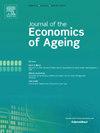在快速老龄化的经济中,老年人友好型工作的发展
IF 2
3区 经济学
Q2 DEMOGRAPHY
引用次数: 0
摘要
近几十年来,韩国劳动力向年龄较大、受教育程度较高的女性转移的速度甚至比美国更大。本文采用Acemoglu、m本文章由计算机程序翻译,如有差异,请以英文原文为准。
The evolution of age-friendly jobs in a rapidly ageing economy
Korea’s labor force shift toward older, female, and more educated workers has been even more dramatic than that of the US in recent decades. This paper documents how Korean job characteristics vary by age and characterizes the “age-friendliness” of Korean employment from 2000 to 2020 by applying the Age-Friendliness Index (AFI) developed by Acemoglu, Mühlbach and Scott to Korean occupational data. The AFI measures job characteristics—such as physical demands and job autonomy—based on occupational descriptions and worker preferences. Our primary empirical findings are that the age-friendliness of Korean jobs grew more slowly than in the US, and that older Koreans were not the main beneficiaries of these jobs. Both findings reflect the demographic, labor market, and institutional differences between Korea and the US. Slow growth of AFI can be partially explained by labor market rigidities, the role of large firms in Korea, and the flattening of managerial structures.
求助全文
通过发布文献求助,成功后即可免费获取论文全文。
去求助
来源期刊

Journal of the Economics of Ageing
Multiple-
CiteScore
4.10
自引率
4.50%
发文量
46
审稿时长
49 days
期刊介绍:
The Journal of the Economics of Ageing (JEoA) is an international academic journal that publishes original theoretical and empirical research dealing with the interaction between demographic change and the economy. JEoA encompasses both microeconomic and macroeconomic perspectives and offers a platform for the discussion of topics including labour, health, and family economics, social security, income distribution, social mobility, immigration, productivity, structural change, economic growth and development. JEoA also solicits papers that have a policy focus.
 求助内容:
求助内容: 应助结果提醒方式:
应助结果提醒方式:


